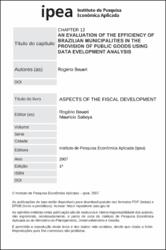Please use this identifier to cite or link to this item:
https://repositorio.ipea.gov.br/handle/11058/12563Full metadata record
| DC Field | Value | Language |
|---|---|---|
| dc.contributor.author | Miranda, Rogério Boueri | - |
| dc.coverage.spatial | Brasil | pt_BR |
| dc.date.accessioned | 2023-11-20T14:10:59Z | - |
| dc.date.available | 2023-11-20T14:10:59Z | - |
| dc.date.issued | 2007 | - |
| dc.identifier.citation | BOUERI, Rogério. An Evaluation ofthe efficiency of Brazilian Municipalities in the provision of public goods using data envelopment analysis. In: BOUERI, Rogério; SABOYA, Maurício (org.). Aspectos do desenvolvimento fiscal. Brasília: IPEA, 2007. p. 139-150. Disponível em: https://repositorio.ipea.gov.br/bitstream/11058/12563/1/Chapter_12_an_evaluation_of_the_efficiency_of_brazilian.pdf | pt_BR |
| dc.identifier.uri | https://repositorio.ipea.gov.br/handle/11058/12563 | - |
| dc.description.abstract | O capítulo discute o contexto fiscal brasileiro, destacando a tentativa de gerar superávits fiscais para reduzir a relação dívida-PIB e promover o declínio sustentado das taxas de juros e o crescimento econômico. Contudo, aponta limitações na estratégia, evidenciadas pelo aumento expressivo da carga tributária, que se aproxima dos 40% do PIB, e pelo crescimento das demandas sociais, resultando em incrementos nas transferências governamentais e despesas de custeio. Além disso, ressalta a compressão insustentável das despesas de investimento governamental, crucial para o crescimento. O autor sugere a melhoria do gasto público como uma saída, buscando atender às demandas sociais com custos decrescentes, sem aumentar a carga fiscal. Destaca a necessidade de mensurar o desperdício de recursos públicos e apresenta a Data Envelopment Analysis (DEA) como um método para avaliar a eficiência na provisão de serviços públicos, destacando sua aplicação em estudos setoriais e comparações entre governos subnacionais, como municípios. O artigo propõe avaliar o montante de recursos que poderiam ser poupados caso os municípios brasileiros despendessem eficientemente os recursos orçamentários, considerando a distribuição geográfica e populacional da ineficiência, bem como a eficiência de escala na produção pública municipal. Essa análise é relevante devido ao crescimento dos gastos municipais e à percepção não empiricamente comprovada de maior desperdício nessa esfera federativa. | pt_BR |
| dc.language.iso | en-US | pt_BR |
| dc.publisher | Instituto de Pesquisa Econômica Aplicada (Ipea) | pt_BR |
| dc.title | An Evaluation of the efficiency of brazilian municipalities in the provision of public goods using data envelopment analysis | pt_BR |
| dc.type | Capítulo de Livro | pt_BR |
| dc.rights.holder | Instituto de Pesquisa Econômica Aplicada (Ipea) | pt_BR |
| dc.source.urlsource | http://desafios.ipea.gov.br/ | pt_BR |
| dc.location.country | BR | pt_BR |
| dc.description.physical | p. 139-150 : il. | pt_BR |
| dc.subject.vcipea | IPEA::Finanças Públicas. Bancos. Relações Monetárias Internacionais::Finanças Públicas. Tributação::Finanças Públicas::Gastos Públicos | pt_BR |
| dc.rights.license | Reproduction of this text and the data it contains is allowed as long as the source is cited. Reproductions for commercial purposes are prohibited. | pt_BR |
| dc.subject.keyword | Gastos públicos | pt_BR |
| dc.subject.keyword | Análise de dados | pt_BR |
| dc.relation.references | https://repositorio.ipea.gov.br/handle/11058/12297 | pt_BR |
| ipea.access.type | Acesso Aberto | pt_BR |
| ipea.rights.type | Licença Comum | pt_BR |
| ipea.englishdescription.abstract | The chapter discusses the Brazilian fiscal context, highlighting the attempt to generate fiscal surpluses to reduce the debt-GDP ratio and promote a sustained decline in interest rates and economic growth. However, it points out limitations in the strategy, evidenced by the significant increase in the tax burden, which approaches 40% of GDP, and the growth in social demands, resulting in increases in government transfers and funding expenses. Furthermore, it highlights the unsustainable compression of government investment expenditure, crucial for growth. The author suggests improving public spending as a solution, seeking to meet social demands with decreasing costs, without increasing the tax burden. It highlights the need to measure the waste of public resources and presents Data Envelopment Analysis (DEA) as a method for evaluating efficiency in the provision of public services, highlighting its application in sectoral studies and comparisons between subnational governments, such as municipalities. The article proposes to evaluate the amount of resources that could be saved if Brazilian municipalities efficiently spent budgetary resources, considering the geographic and population distribution of inefficiency, as well as the efficiency of scale in municipal public production. This analysis is relevant due to the growth in municipal spending and the non-empirically proven perception of greater waste in this federal sphere. | pt_BR |
| ipea.researchfields | N/A | pt_BR |
| ipea.classification | Administração Pública. Governo. Estado | pt_BR |
| Appears in Collections: | Administração Pública. Governo. Estado: Capítulos de Livros | |
Files in This Item:
| File | Description | Size | Format | |
|---|---|---|---|---|
| Chapter_12_an_evaluation_of_the_efficiency_of_brazilian.pdf | 1.42 MB | Adobe PDF |  View/Open |
Items in DSpace are protected by copyright, with all rights reserved, unless otherwise indicated.

